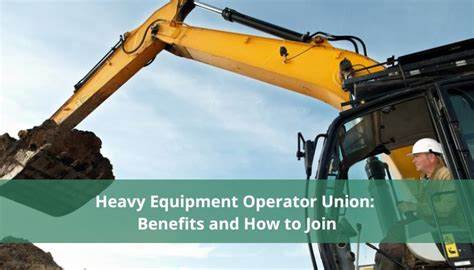The rumble of engines, the precision of maneuvering, and the satisfaction of a job well done – these are the hallmarks of a heavy equipment operator’s career. But behind the impressive machines lies a dedication to safety, fair compensation, and professional development. Here’s where heavy equipment operator unions enter the picture.
This comprehensive guide delves into the world of these unions, exploring the numerous benefits they offer members and outlining the steps to join one.
The Strength of Solidarity: What are Heavy Equipment Operator Unions?
Heavy equipment operator unions are labor organizations that represent the collective interests of equipment operators employed in various construction and related sectors. These unions work to ensure their members receive fair wages, benefits, and working conditions. They also advocate for safety standards, training opportunities, and career advancement for their members.
A Union Advantage: Unveiling the Benefits of Membership
Joining a heavy equipment operator union offers a multitude of advantages over remaining a non-union employee:
- Improved Wages and Benefits: Unions negotiate collective bargaining agreements with employers, securing more competitive wages, overtime pay, and comprehensive benefits packages. These packages may include health insurance, retirement plans, paid time off (PTO), and access to training programs.
- Enhanced Job Security: Unions often have provisions in their contracts that protect members from layoffs or unfair termination practices. This provides peace of mind and allows operators to focus on their work without constant job search anxiety.
- Improved Working Conditions: Unions advocate for safe working environments and enforce safety regulations on construction sites. They also push for reasonable working hours and breaks, reducing fatigue and promoting operator well-being.
- Access to Training and Education: Many unions offer or partner with training programs to help members hone their skills and learn new techniques. This allows operators to stay up-to-date with the latest advancements in the industry and potentially qualify for operating different types of equipment, expanding their career opportunities.
- Stronger Voice and Representation: Individual operators may struggle to negotiate for fair treatment on their own. Unions provide a strong collective voice, allowing members to have their concerns heard and addressed by employers. This empowers operators and ensures their perspectives are factored into workplace decisions.
- Legal Support and Grievance Procedures: Unions offer legal assistance to members facing workplace disputes or unfair treatment. Grievance procedures outlined in union contracts provide a structured framework for resolving workplace issues.
Considering the Union Route: Factors to Weigh In
Before joining a heavy equipment operator union, consider these factors:
- Union Dues and Fees: Unions typically charge membership dues and fees to cover the costs of negotiation, legal representation, and other services. Weigh the financial benefits of union membership against these costs.
- Union Reputation: Research the union you’re considering. Look into their track record in negotiating contracts, advocating for members, and providing services.
- Industry Focus: Some unions represent a broad range of construction workers, while others specialize in specific equipment operators like crane operators or heavy equipment mechanics. Choose a union that aligns with your career goals and equipment expertise.
Joining the Ranks: Steps to Become a Unionized Heavy Equipment Operator
The process for joining a heavy equipment operator union can vary slightly depending on the specific union and local regulations. Here’s a general roadmap:
- Research Potential Unions: Identify unions operating in your area that represent heavy equipment operators. Their websites or local chapters can provide information about their services, membership requirements, and application processes.
- Contact the Union: Reach out to the union’s membership department or local chapter. They can answer your questions and guide you through the application process.
- Meet Membership Requirements: Unions may have specific membership requirements. These might include a minimum number of years of experience operating relevant equipment, completion of a training program, or possession of certain licenses or certifications.
- Pay Initiation Fees and Dues: Once your application is accepted, you’ll be required to pay any initiation fees and ongoing membership dues to maintain your union membership status.
Beyond Joining: Active Participation in the Union
Becoming a union member isn’t a passive act. Active participation strengthens the collective voice and ensures the union effectively represents its members. Here’s how to get involved:
- Attend Union Meetings: Regular union meetings provide a platform for members to stay informed about union activities, vote on important issues, and voice any concerns.
- Run for Union Office: Consider running for a position on the union’s local chapter board or leadership positions. This allows you to contribute directly to decision-making and advocate for your fellow operators.
- Volunteer Your Time: Many unions rely on volunteers to assist with various activities like organizing events, outreach programs, or member education initiatives.
Conclusion: Building a Stronger Future Together
Joining a heavy equipment operator union isn’t just about securing benefits; it’s about building a stronger future for yourself and your fellow operators. Unions provide a collective voice that can influence industry standards, advocate for safety improvements, and ensure fair treatment for all.
A Rewarding Career Path: A Final Note
A career as a heavy equipment operator offers a unique blend of challenge, physical activity, and the satisfaction of contributing to the construction of essential infrastructure. By leveraging the power of unions, operators can ensure they are well-compensated, well-represented, and have access to the resources and training needed to advance their careers.
So, if you’re considering a path in heavy equipment operation, take some time to research the unions operating in your area. The solidarity and support offered by these organizations can be instrumental in shaping a rewarding and successful career behind the controls of these powerful machines.
